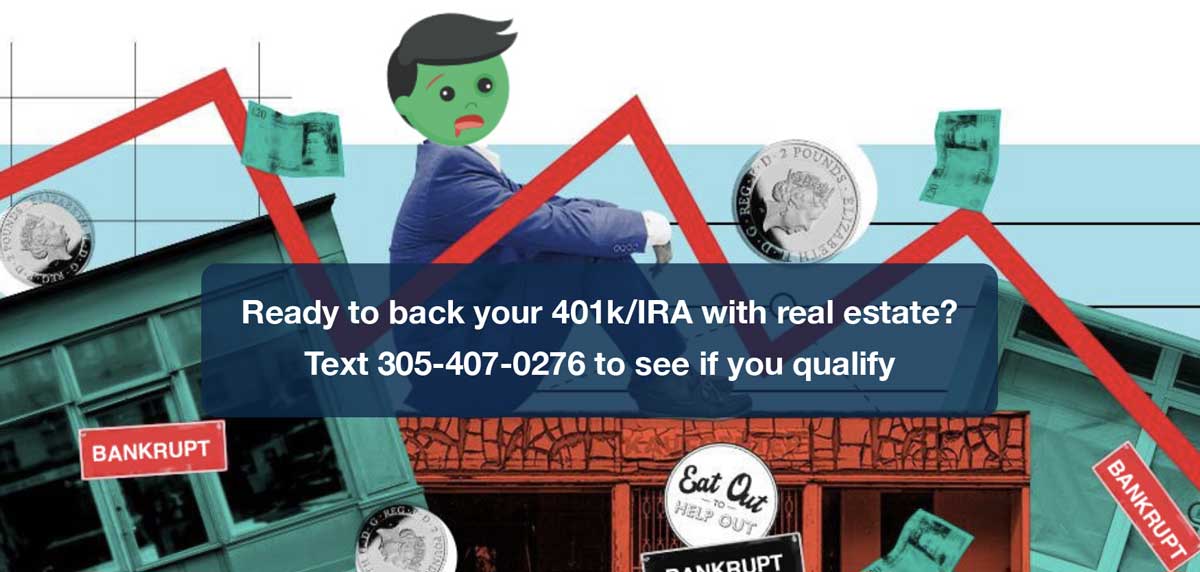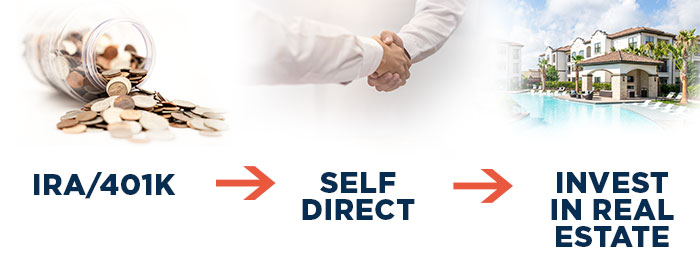How To Convert Your 401K/IRA Into Physical Real Estate Without Penalty
It’s no secret that real estate has been used for thousands of years to create massive wealth.
With the economy and markets in such turmoil, many people are looking for better ways to protect their retirement savings.
One of the best ways to do this is by investing your 401(k)/IRA in physical real estate assets that provide cash flow, as well as appreciation.
You’re probably asking… How do I go about doing this?
This guide was created to give you a step-by-step on how to invest your 401(k) / IRA into real estate without any penalties.

Why Real Estate Has Performed over the Last Thousand Years
There are many advantages when converting your 401(k)/IRA to real estate. Real estate over the last thousand years has been a stable investment that many have used to protect wealth. Now real estate can be used to help you protect your retirement savings from huge market fluctuations as well as inflation.
When investing in real estate, you want to consider the six main benefits – Cash flow, appreciation, tax benefits, leverage, tangibility, and hedge against inflation.
Real estate by nature pays investors while they wait for appreciation, unlike other investments that only have value on paper and at time of sale.
In addition, real estate is a tangible physical asset, you can look, see and touch unlike a stock or a bond. Everyone needs a place to live or work and this hasn’t changed in a thousand years.
Unlike stocks or bonds, in most situations, real estate also allows investors to write off depreciation and receive tax benefits while earning income from the assets.
Real estate has also been used as a hedge against inflation throughout time. This is primarily due to the fact that real estate appreciates as populations grow and they continue to need a place to work or live.
Finally, Real estate is one of the few asset classes that is almost always purchased using leverage. Financing provides investors with a way to carry their investments further by using other people’s money to purchase assets.

Stock Markets are Risky
The stock market was not specifically built for retirement accounts, but rather as a way for companies to raise capital by issuing shares of stock. Investors then buy and sell these shares on the stock market, with the value of the shares fluctuating based on a variety of factors, such as the company’s performance and overall market conditions.
You are told the stock market can be a valuable tool for retirement savings, it is inherently risky. The value of investments can fluctuate greatly over time, and there is always the possibility of losing part or all of your money.
To manage this risk, many individual retirement accounts (IRAs) and 401(k) plans offer a variety of investment options, including mutual funds and exchange-traded funds (ETFs), which may hold shares of publicly traded companies. Some of these companies may be considered “zombie companies” – firms that are barely profitable and heavily reliant on debt to stay afloat.
In fact, these zombie companies are worth billions of dollars on paper but have never profited one dollar.
There’s also a good chance your IRA or 401(k) is exposed to companies you have moral objections to & a very good chance those companies are actually headed for extinction.
The stock market wasn’t created for you to WIN!

Why You Should Invest In Real Estate
There are many advantages when converting your 401(k)/IRA to real estate. Real estate over the last thousand years has been a stable investment that many have used to protect their wealth. Now real estate can be used to help you protect your retirement savings from huge market fluctuations as well as inflation.
The Main Reason To Invest In Real Estate:
- Cashflow: Instead of living off of the principal in your retirement account. Real estate provides monthly cash flow that you can live on without the reduction of your principal.
-
Long Term Appreciation: Real estate can appreciate in value over time, leading to potential capital gains. Most real estate professionals target 2x to 3x return on investment. (This includes cash flow & appreciation)
-
Tax benefits: 401k/IRA plans provide tax benefits such as tax-deferred growth, while real estate provides tax benefits such as deductions for mortgage interest and depreciation. Individuals should speak to their own tax advisors or tax professionals.
-
Leverage: Financing provides investors with a way to carry their investments further by using other people’s money to purchase assets.
-
Tangible: They are real assets -not paper- and cannot be easily built, replaced or destroyed.
-
Diversification: When you invest in apartment complexes you are spread out over hundreds of doors, not just one. The benefit of owning real estate during inflationary times is that it provides a hedge against inflation. As the cost-of-living increases, so do property values and rental income.

Cashflow & Appreciation
Real estate allows ordinary people to protect their hard-earned money, and get positive cash flow, while they wait for appreciation and pay down debt.
Retirees often prioritize cash flow during their retirement years because it provides a stable source of income to cover living expenses and other financial obligations. Cash flow can come from various sources, such as rental income from real estate investments, dividends from stocks, or interest from bonds.
Real estate is one of the popular options for retirees as it can provide a steady source of cash flow through rental income, and it can also offer the potential for long-term appreciation.
The ultimate goal of real estate in retirement accounts is to protect your investment, not lose your money, and provide cash flow when you retire.
If you showed an alien, stock certificates & real estate and asked him which one was the best investment for a retirement account, he would always pick real estate.

Tax Advantages
The greatest tax advantages & loopholes are in real estate. Stocks, bonds & commodities provide NONE.
A self-directed 401K/IRA (individual retirement account) can provide tax advantages when investing in real estate. Here are a few examples:
-
Tax-deferred growth: With a traditional IRA, any income or capital gains generated by the real estate investment are not taxed until the funds are withdrawn in retirement. This can result in significant tax savings over time.
-
Tax-free withdrawals: With a Roth IRA, the funds used to purchase the real estate have already been taxed, so any income or capital gains generated by the investment can be withdrawn tax-free in retirement.
-
Depreciation deductions: Many real estate investors can take depreciation deductions on the property, which can offset any rental income earned and reduce the overall tax liability.

How to Convert 401k/IRA to Real Assets
Converting retirement accounts into real assets, rather than paper mysteries, is now possible. Real estate-based 401K/IRAs have been kept a big secret because Wall Street doesn’t want you investing in real assets, they want the fees. They want you addicted to their casino symbols and paper products
To convert retirement accounts into real assets, you can use a strategy called a “self-directed IRA” or “self-directed 401(k)”. This allows you to use the funds in your retirement account to invest in real estate.
Here’s an overview of the process:
-
Set up a self-directed IRA or 401(k) with a custodian or administrator who specializes in this type of account.
-
Transfer or roll over funds from your existing retirement account into your self-directed account.
-
Use the funds in your self-directed account to make investments in real assets.
It’s important to note that there are certain rules and regulations that apply to self-directed retirement accounts, such as prohibited transactions and the requirement that the assets purchased with the account funds must be held by the custodian or administrator.

In Closing
While many retirement assets are currently invested in traditional asset classes such as stocks, mutual funds, ETF’s and bonds, many investors are realizing the benefits of alternative asset classes, real estate being one of the keys among them. It’s no surprise that pension funds and other institutional investors continue to invest in real estate as a way to hedge against the volatility of the stock market. As an example, for the 12 month period ending in December of 2022, the S&P 500 was down approximately 20% & Nasdaq was down approximately 33%.
Wall Street benefits from market activity regardless of whether the market is going up or down every time a stock or other securities are bought or sold in an actively managed portfolio. This is because every time a trade is made, there is a transaction fee that is paid to the brokerage firm or financial institution executing the trade. These fees can add up over time and can have a significant impact on the overall returns of the portfolio.
On the other hand, Real estate investing has one-time costs such as closing costs, appraisal fees, and inspections, but these costs can be generally lower than the cumulative ongoing transaction fees associated with buying and selling stocks, and it can offer the potential for passive income through rental income and long-term appreciation. In addition, many of these costs become tax deductible as part of depreciation.
In truth, Wall Street wins whether the market goes up or down, not you.
We want you to win.
Ready to back your 401k/IRA with real estate? Call or Text 305-407-0276 to see if you qualify




